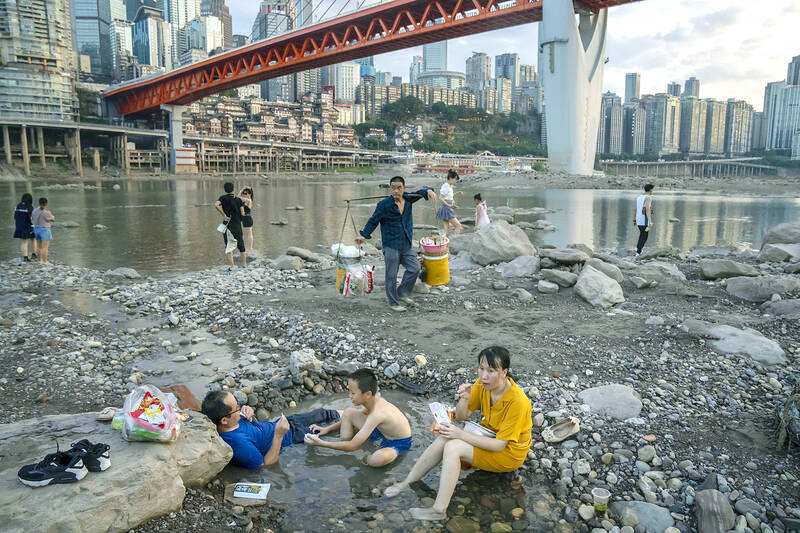Brutally hot weather is expected to hit China this summer, threatening a new round of power shortages that last year disrupted global supply chains of everything from vehicles to solar panels.
The electricity supply situation would be tight across the entire nation this summer, state-run China Energy News reported, citing the Chinese State Grid Energy Research Institute.
Central, eastern and southwestern provinces are likely to experience shortages during periods of peak demand, the institute said.

Photo: AP
A heat wave is already scorching parts of Asia even before the official start of the northern hemisphere summer, sending temperatures to a record 44.2°C in Vietnam, shutting schools early in the Philippines and putting India on alert for blackouts.
Climate change is exacerbating the frequency of extreme weather incidents, scientists at research groups such as World Weather Attribution say.
In China, temperatures in most parts of the nation would be relatively high this summer, with several regions forecast to experience periodic heat waves, the Chinese Meteorological Administration said.
More frequent droughts and flood-inducing rainstorms are also expected.
Last year, extreme heat and a lack of rain dried up the Yangtze River, with water reaching the lowest level on record in some stretches. That caused severe power shortages in areas dependent on hydroelectricity, such as Sichuan and Yunnan provinces, with officials curtailing supply to factories to ensure people could run air-conditioners at home.
Toyota Motor Corp and Honda Motor Co were among the companies affected.
In Yunnan, a key aluminum hub, power rationing began anew last month after another severe drought.
Despite that, the Shanghai Metals Market said output of the metal from southern China last month increased from March, as smelters restarted after upgrades, and should rise further this month.
Extreme weather is also affecting crops from rubber to peanuts, potentially requiring more imports to fill the gap and roiling global trade flows.
Beijing has prepared by ramping up production of coal, still its most important source of electricity even as utilities add record amounts of new wind and solar. Approvals have also been granted for a massive expansion of power plants using the fuel, many of which are intended to only be fully utilized at times of stress on power supply.
Current high coal inventories mean a nationwide power crisis is unlikely, Bloomberg NEF China Research head Nannan Kou said.

Kehinde Sanni spends his days smoothing out dents and repainting scratched bumpers in a modest autobody shop in Lagos. He has never left Nigeria, yet he speaks glowingly of Burkina Faso military leader Ibrahim Traore. “Nigeria needs someone like Ibrahim Traore of Burkina Faso. He is doing well for his country,” Sanni said. His admiration is shaped by a steady stream of viral videos, memes and social media posts — many misleading or outright false — portraying Traore as a fearless reformer who defied Western powers and reclaimed his country’s dignity. The Burkinabe strongman swept into power following a coup in September 2022

‘FRAGMENTING’: British politics have for a long time been dominated by the Labor Party and the Tories, but polls suggest that Reform now poses a significant challenge Hard-right upstarts Reform UK snatched a parliamentary seat from British Prime Minister Keir Starmer’s Labor Party yesterday in local elections that dealt a blow to the UK’s two establishment parties. Reform, led by anti-immigrant firebrand Nigel Farage, won the by-election in Runcorn and Helsby in northwest England by just six votes, as it picked up gains in other localities, including one mayoralty. The group’s strong showing continues momentum it built up at last year’s general election and appears to confirm a trend that the UK is entering an era of multi-party politics. “For the movement, for the party it’s a very, very big

ENTERTAINMENT: Rio officials have a history of organizing massive concerts on Copacabana Beach, with Madonna’s show drawing about 1.6 million fans last year Lady Gaga on Saturday night gave a free concert in front of 2 million fans who poured onto Copacabana Beach in Rio de Janeiro for the biggest show of her career. “Tonight, we’re making history... Thank you for making history with me,” Lady Gaga told a screaming crowd. The Mother Monster, as she is known, started the show at about 10:10pm local time with her 2011 song Bloody Mary. Cries of joy rose from the tightly packed fans who sang and danced shoulder-to-shoulder on the vast stretch of sand. Concert organizers said 2.1 million people attended the show. Lady Gaga

SUPPORT: The Australian prime minister promised to back Kyiv against Russia’s invasion, saying: ‘That’s my government’s position. It was yesterday. It still is’ Left-leaning Australian Prime Minister Anthony Albanese yesterday basked in his landslide election win, promising a “disciplined, orderly” government to confront cost-of-living pain and tariff turmoil. People clapped as the 62-year-old and his fiancee, Jodie Haydon, who visited his old inner Sydney haunt, Cafe Italia, surrounded by a crowd of jostling photographers and journalists. Albanese’s Labor Party is on course to win at least 83 seats in the 150-member parliament, partial results showed. Opposition leader Peter Dutton’s conservative Liberal-National coalition had just 38 seats, and other parties 12. Another 17 seats were still in doubt. “We will be a disciplined, orderly